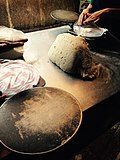Masa
Masa is a type of dough that is made from corn that has been soaked and cooked in an alkaline solution. This process, known as nixtamalization, breaks down the corn's hemicellulose, the major component of the corn's cell walls, and makes the nutrients in the corn more bioavailable. Masa is used in making many traditional Mexican dishes, including tortillas, tamales, and pupusas.
History[edit]
The process of nixtamalization was developed in Mesoamerica thousands of years ago. The Maya, Aztecs, and other indigenous peoples discovered that soaking corn in a solution of water and lime or ashes made the corn easier to grind and also improved its nutritional value. This process was crucial to the development of these civilizations, as corn is a staple food in Mesoamerica and the process of nixtamalization makes it a more complete source of protein.
Preparation[edit]
To make masa, dried corn is soaked in a solution of water and calcium hydroxide, also known as slaked lime. The corn is then cooked in this solution until the skins of the kernels can be easily removed. After the skins are removed, the corn is rinsed and then ground into a dough. This dough can then be used to make tortillas, tamales, and other dishes.
Uses[edit]
Masa is used in a variety of dishes in Mexican cuisine. It is the main ingredient in tortillas, which are used in many dishes such as tacos, enchiladas, and quesadillas. Masa is also used to make tamales, a traditional Mexican dish that consists of masa filled with meat, cheese, or fruits, and then wrapped in a corn husk and steamed. In addition, masa is used to make pupusas, a dish from El Salvador that is similar to a stuffed tortilla.
See also[edit]
Ad. Transform your life with W8MD's Budget GLP-1 injections from $75


W8MD offers a medical weight loss program to lose weight in Philadelphia. Our physician-supervised medical weight loss provides:
- Weight loss injections in NYC (generic and brand names):
- Zepbound / Mounjaro, Wegovy / Ozempic, Saxenda
- Most insurances accepted or discounted self-pay rates. We will obtain insurance prior authorizations if needed.
- Generic GLP1 weight loss injections from $75 for the starting dose.
- Also offer prescription weight loss medications including Phentermine, Qsymia, Diethylpropion, Contrave etc.
NYC weight loss doctor appointmentsNYC weight loss doctor appointments
Start your NYC weight loss journey today at our NYC medical weight loss and Philadelphia medical weight loss clinics.
- Call 718-946-5500 to lose weight in NYC or for medical weight loss in Philadelphia 215-676-2334.
- Tags:NYC medical weight loss, Philadelphia lose weight Zepbound NYC, Budget GLP1 weight loss injections, Wegovy Philadelphia, Wegovy NYC, Philadelphia medical weight loss, Brookly weight loss and Wegovy NYC
|
WikiMD's Wellness Encyclopedia |
| Let Food Be Thy Medicine Medicine Thy Food - Hippocrates |
Medical Disclaimer: WikiMD is not a substitute for professional medical advice. The information on WikiMD is provided as an information resource only, may be incorrect, outdated or misleading, and is not to be used or relied on for any diagnostic or treatment purposes. Please consult your health care provider before making any healthcare decisions or for guidance about a specific medical condition. WikiMD expressly disclaims responsibility, and shall have no liability, for any damages, loss, injury, or liability whatsoever suffered as a result of your reliance on the information contained in this site. By visiting this site you agree to the foregoing terms and conditions, which may from time to time be changed or supplemented by WikiMD. If you do not agree to the foregoing terms and conditions, you should not enter or use this site. See full disclaimer.
Credits:Most images are courtesy of Wikimedia commons, and templates, categories Wikipedia, licensed under CC BY SA or similar.
Translate this page: - East Asian
中文,
日本,
한국어,
South Asian
हिन्दी,
தமிழ்,
తెలుగు,
Urdu,
ಕನ್ನಡ,
Southeast Asian
Indonesian,
Vietnamese,
Thai,
မြန်မာဘာသာ,
বাংলা
European
español,
Deutsch,
français,
Greek,
português do Brasil,
polski,
română,
русский,
Nederlands,
norsk,
svenska,
suomi,
Italian
Middle Eastern & African
عربى,
Turkish,
Persian,
Hebrew,
Afrikaans,
isiZulu,
Kiswahili,
Other
Bulgarian,
Hungarian,
Czech,
Swedish,
മലയാളം,
मराठी,
ਪੰਜਾਬੀ,
ગુજરાતી,
Portuguese,
Ukrainian



